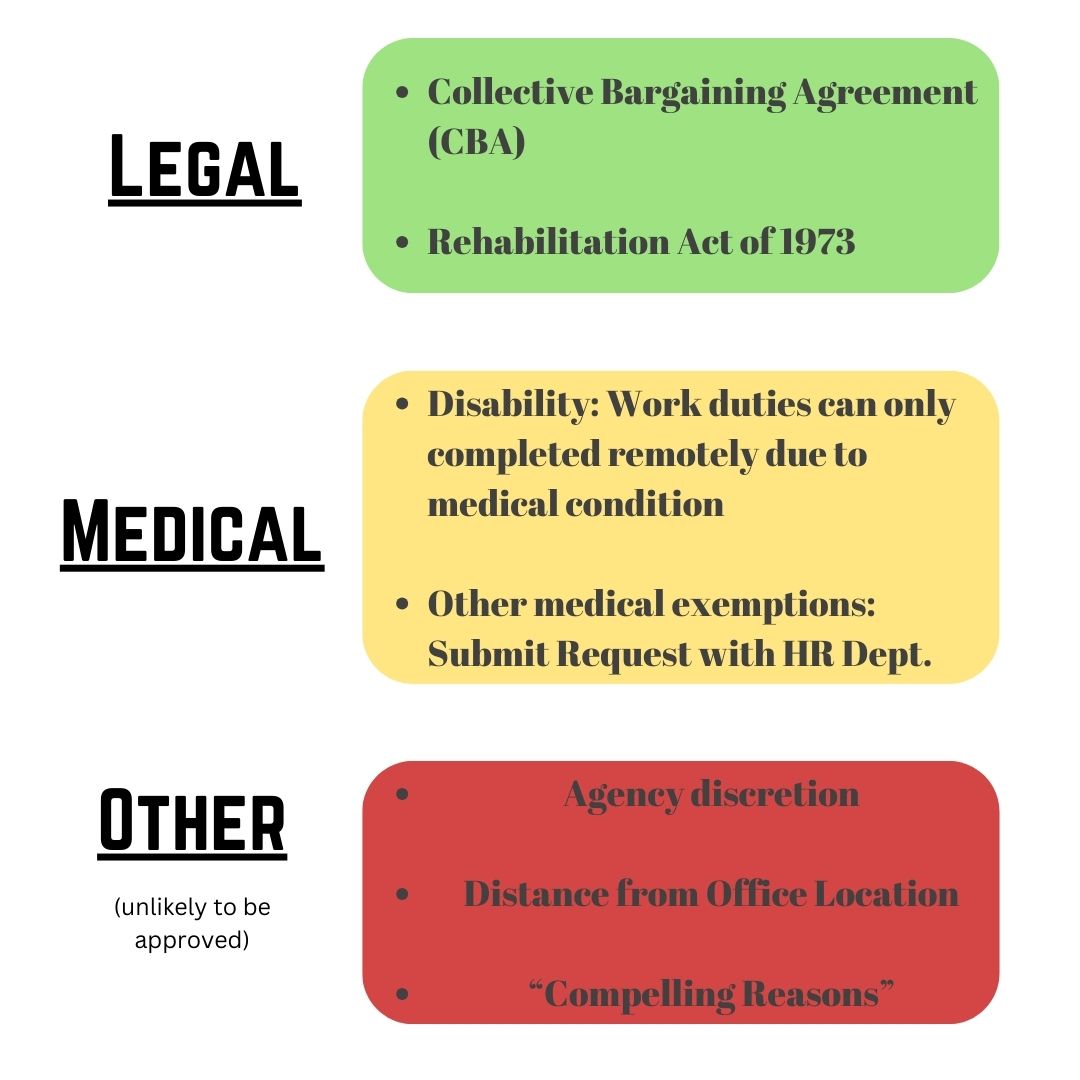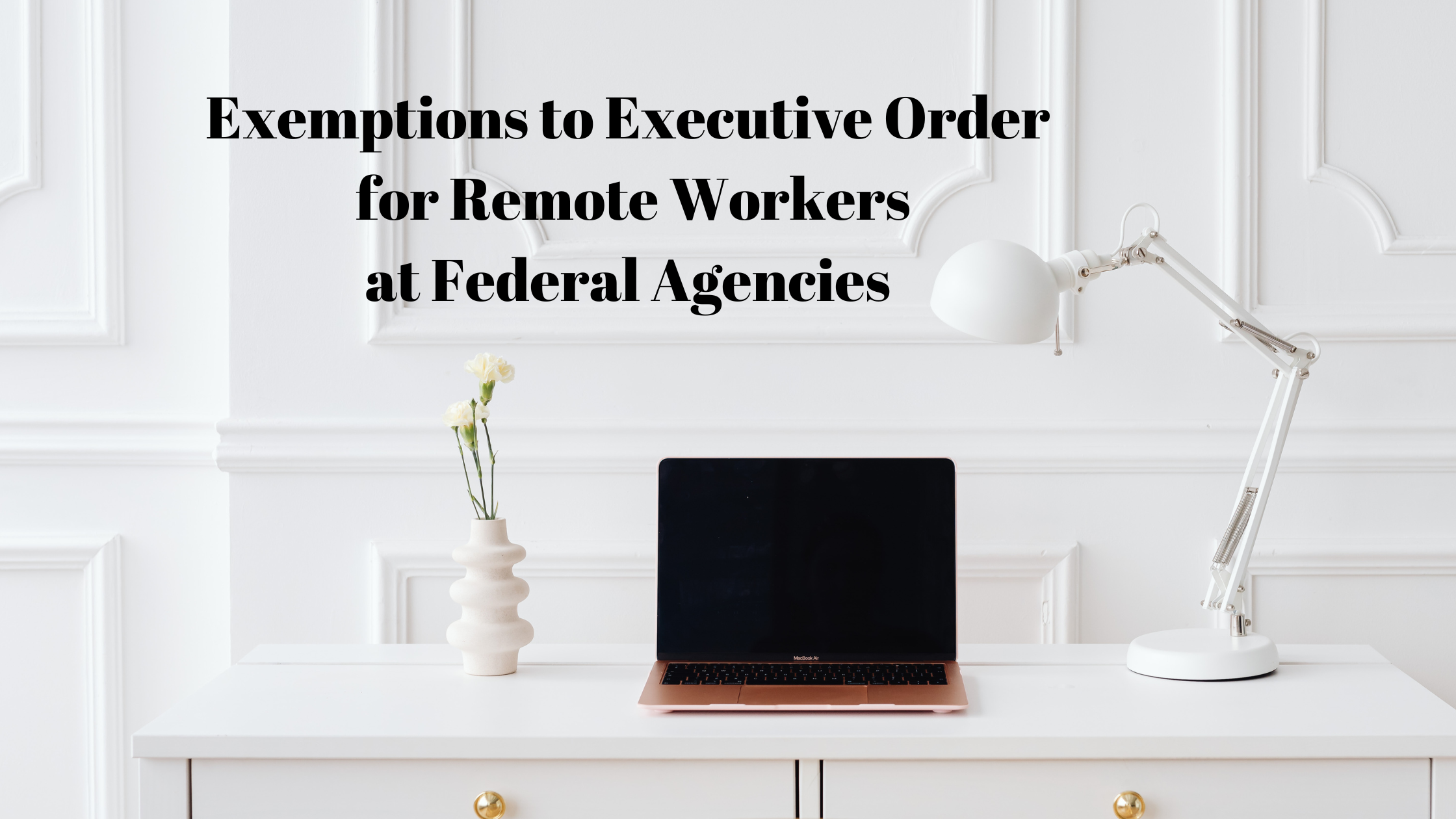Explore the guidelines for federal employee telework exemptions under the recent executive order, as departments and agencies in the executive branch prepare for a return to in-person work.
Federal Agencies Directed by OPM to Ensure Return to In-Person Work – Are Some Employees Exempt?
The Office of Personnel Management (OPM) has issued a directive mandating federal employees to return to in-person work following the White House’s executive order to end telework for the federal workforce. This significant shift marks a departure from the remote work arrangements that have been prevalent since the onset of the pandemic. As federal agencies prepare to comply with this directive, the implications for the federal workforce, hiring practices, and overall productivity are profound. This article explores the details of the OPM’s directive, the transition process for employees, and what legal, medical, or procedural exemptions may exist for federal employees who want to remain remote.
Need to start crafting your retirement plan? Sign up for a free federal retirement webinar.
What is the OPM’s Directive on Returning to In-Person Work?
How Does the Directive Affect Government Agencies of the Executive Branch?
The directive significantly impacts federal agencies that operate under the executive branch by requiring them to reassess their current work arrangements and require employees to return to work in-person. President Trump’s order to heads of all departments was to take all necessary steps to terminate remote work “as soon as practicable …” but a recent memo from OPM officially gave affected agencies a 30-day window to develop comprehensive plans to transition their workforce back to the office. This involves logistical considerations such as workspace reconfiguration, health and safety protocols, and communication strategies to inform employees about the changes.
Exemptions Available to Federal Employees Return to Office Mandate
CBAs and Disability Exemptions
Of the approximately 600,000 employees of the US government that are unionized and thus protected by a collective bargaining agreement (CBA), it is unclear how many are currently working remotely or in a hybrid situation. Also, how many of these agreements include teleworking provisions can be a bit difficult to determine. Nonetheless, these CBAs are legally binding and cannot be undone by an executive order so easily. If you are in a unionized position, and your CBA allows for some sort of remote work arrangement, the executive order does not apply for the most part. If disabled, you might have a legal exemption through the Rehabilitation Act of 1973, although you would have to prove you were unable to perform your work duties on-site due to the underlying injury or condition.
Health Exemptions for Federal Workers Returning to Office Full-Time
Department and Agency heads are allowed to make exemptions to the directive to terminate remote work arrangements, if absolutely medically necessary. A form can be provided by your HR department upon request, and should include instructions for submitting the form along with documents to support your exemption request. Depending upon the illness or medical issue, protections included in the aforementioned 1973 law could give you the legal upper-hand. Other exemptions not related to health that used to be allowed at an agency’s discretion, including distance from office location and “compelling reasons,” will probably be more scrutinized and less likely to fly within government agencies in order to comply with Trump’s mandate, stemming from one of the first executive orders issued in his second term.
Possible Exemptions to Executive Order to Terminate Remote Work for Feds

How Will Federal Civilian Employees Transition from Telework to In-Person Work?
What Support is Available for Employees Returning to the Office?
Roughly 10% of feds are currently fully remote but nearly half (46%) of the government’s workforce, over a million people, were eligible for some telework prior to January 20. To facilitate a smooth transition from telework to in-person work, the federal government will provide necessary support for employees. This includes resources for mental health and well-being, as well as training programs to help employees adapt to the new work environment. Agencies are encouraged to offer flexible work schedules and other accommodations to ease the transition. Additionally, OPM is working closely with federal departments to ensure that employees have access to the necessary tools and technology to perform their duties effectively upon returning to work on-site.
How Will Remote Work Arrangements Be Handled?
While the directive mandates a return to in-person work, remote work arrangements will not be entirely eliminated. Agencies are tasked with evaluating requests for continued telework on a case-by-case basis, considering factors such as job function, performance, and personal circumstances. OPM has provided guidelines to help agencies determine eligibility for remote work exemptions, ensuring that decisions are fair and consistent across the federal government.
Implications for Federal Government’s Departments and Agencies
How Will Departments Ensure Compliance with the Directive?
Federal departments and agencies are required to develop and implement strategies to ensure compliance with the OPM’s directive. This involves establishing clear policies and procedures for the return to in-person work, as well as monitoring and reporting progress to the OPM. Agencies must also engage with employee unions and other stakeholders to address concerns and negotiate any necessary adjustments to work arrangements. Compliance efforts are supported by the OPM, which provides guidance and resources to assist agencies in meeting the directive’s requirements.
How Will Agencies Address Potential Exemptions?
Agencies must carefully consider requests for exemptions from the return-to-office mandate. OPM has established criteria for evaluating exemption requests, which include factors such as medical conditions, caregiving responsibilities, and job-specific requirements. Agency leaders may choose to adopt a flexible approach, balancing the need for in-person presence with individual employee circumstances.
Federal Hiring Freeze and Return to Office Mandate’s Potential Impact
The return to in-person work may have brought the consequence of increased hiring with more demand for personnel to support in-person operations. However, the new White House has also put a hiring freeze in place for 2025. With some employees refusing to comply with the transition to on-site work by either retiring or quitting, the return to in-person work is expected to have a mixed impact on employee productivity. While some employees may benefit from increased collaboration and access to resources in the office, others will face challenges readjusting to the traditional work environment along with reduced staff numbers potentially increasing the workload for individuals. By fostering a supportive work environment, agencies could mitigate potential productivity losses and enhance overall performance.
Reach Out to Us!
If you have additional federal benefit questions, contact our team of CERTIFIED FINANCIAL PLANNER™ (CFP®), Chartered Federal Employee Benefits Consultants (ChFEBC℠), and Accredited Investment Fiduciary (AIF®). At PlanWell, we are federal employee financial advisors with a focus on retirement planning. Learn more about our process designed for the career fed.
Preparing for federal retirement? Check out our scheduled federal retirement workshops. Sign up for our no-cost federal retirement webinars federal retirement workshops. Make sure to plan ahead and reserve your seat for our FERS webinar, held every three weeks. Want to have PlanWell host a federal retirement seminar for your agency? Reach out, and we’ll collaborate with HR to arrange an on-site FERS seminar.
Want to fast-track your federal retirement plan? Skip the FERS webinar and start a one-on-one conversation with a ChFEBC today. You can schedule a one-on-one meeting here.










